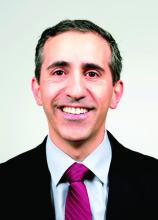The American Gastroenterological Association has made the first investment through its new venture capital fund – an initiative that gives gastroenterologists a financial opportunity combined with a chance to help corporations trying to make a difference in the field.
It was established in partnership with Varia Ventures.
The AGA recently announced the fund’s first investment with Carlsbad, Calif.–based Virgo Surgical Video Solutions, which offers endoscopy video recording that uses artificial intelligence for ease of use during procedures, for reviewing video later, and for using video to connect trial investigators with potential candidates.
“While AGA has long guided innovators who share our goal of improving digestive health care, we have doubled down on this commitment by establishing the GI Opportunity Fund,” said Lawrence Kosinski, MD, AGAF, AGA Governing Board Councilor for Development and Growth. “The fund’s first investment – Virgo – exemplifies our pursuit of improved clinical care.”
He said the fund gives physicians a chance to work closely with AGA to invest in difference-making ventures.
“Through our venture fund, gastroenterologists can join AGA to invest in fast-growing, early-stage companies that are transforming care for patients with digestive disease,” Dr. Kosinski said.
Virgo CEO Matthew Z. Schwartz said the company’s product is intended to fill an important need.
“We recognized that it was really difficult for doctors to capture endoscopy procedures video in high-definition at scale,” he said. “Generally, they were just taking still images. And the images were often not of great quality.”
Virgo offers a small device that connects to existing endoscopy equipment, plugging into the back of a video processor, securely compressing and encrypting video and sending it to Virgo’s HIPAA-compliant cloud storage Web portal. Once it’s plugged in, Mr. Schwartz said, it’s “set it and forget it.”
“We try to make it as easy as possible for doctors to record their video – which means we don’t want them to have to do anything different about their normal clinical workflow in order to generate these videos,” Mr. Schwartz said. Physicians don’t even have to press a start or stop button – Virgo’s machine-learning algorithm detects when to start and stop video recording by discerning when the scope is inserted and removed.
“A goal of ours is to change the paradigm for endoscopy to help make sure that every procedure is captured in HD to the cloud,” he said.
The service also includes an “auto-highlight” feature that detects important moments in the procedure video. It automatically marks points in the video when the physician takes a still image and moments when an instrument, such as a snare or forceps, is present in the field of view. This, Mr. Schwartz said, makes it “easy in playback to focus on important aspects of the procedure.”
There is also a clinical trial screening feature, called “auto IBD,” that involves an algorithm that assesses videos to identify patients most likely to be eligible candidates for clinical trials. Mr. Schwartz said that procedures and patients who might go unconsidered – if they are performed at an affiliated community hospital or at an endoscopy center, for instance – can now be brought to the attention of trial investigators, without the need to comb through hundreds or thousands of candidates.
“We believe there are many more patients with these diseases that are eligible for IBD clinical trials than are currently being exposed to research opportunities within large health systems,” he said.
The proceeds from the AGA’s Opportunity Fund will be used, in part, to expand Virgo’s reach, he added. Virgo’s connection with the AGA began with its participation in the AGA Tech Summit Shark Tank competition in 2018.
“For us, the name of the game is getting Virgo in the hands of as many physicians and health systems as possible,” Mr. Schwartz said. “So we’ll be using these proceeds to build up the team and work on global distribution.” The company is also “looking to refine machine-learning algorithms and build out new features and tools.”
Ziad Gellad, MD, MPH, associate professor of medicine in gastroenterology at Duke University, Durham, N.C., was one of the Opportunity Fund’s earliest member investors.
“I was looking for ways to diversify my portfolio and this was an attractive way to get into an area of investment that is not easily accessible, and so I was excited about that,” said Dr. Gellad, who himself is cofounder of a health start-up that develops software for patient navigation and outcomes collection but is not associated with the fund.
“As a start-up cofounder myself, I understand the needs of founders of companies, especially those in the GI space and appreciate the struggles they face,” Dr. Gellad added. “The opportunity to contribute to that was appealing.”
“I also believe that specialty societies like the AGA need to diversify their funding strategy and I think this is a really innovative way to do that,” he said.






